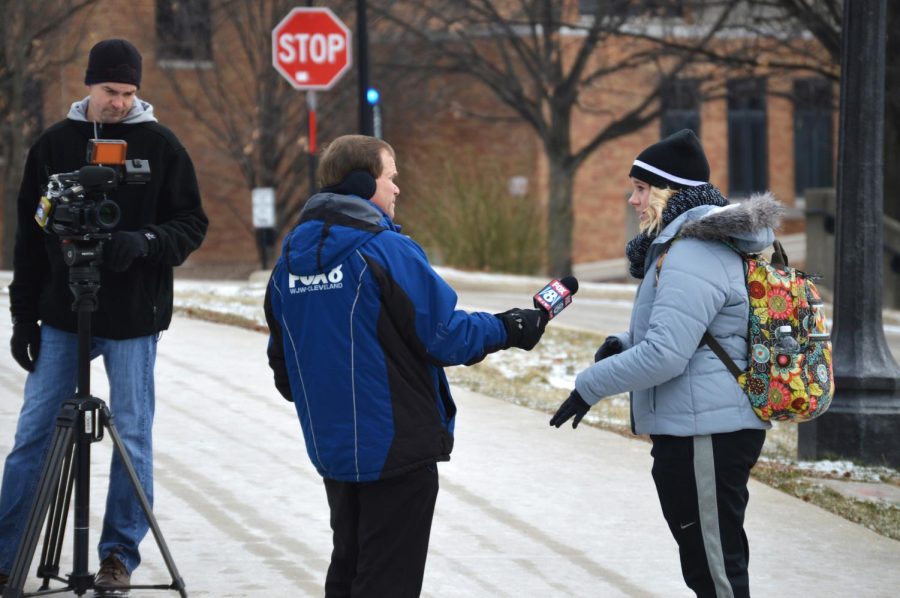Students, alumni reflect on Pino’s teaching style
Freshman fashion merchandising major Taylor Doyle interviews with Fox 8 local news on Wednesday, Jan. 20, 2016. She discussed recent allegations regarding professor Julio Pino’s link to ISIS.
January 20, 2016
As the Facebook shares escalated to over 5,000 on CNN, FOX News and ABC, many Kent State students were shocked and surprised that the FBI had taken an interest in Julio Pino.
The history professor’s alleged link to ISIS sent the campus into a frenzy — some tweeted their fear in attending school, and parents posted their disappointment in the school system. Amongst the social media uproar were those stating Pino was their professor.
Harold Horsley, a sophomore theater studies major, had Pino as his professor last semester.
In Pino’s Modern World History class, Horsley depicted Pino as “racially insensitive on multiple instances.” To Horsley, the accusations against Pino did not necessarily come as a huge surprise.
Horsley also recalled Pino referred to his students using the n-word, and one of them was his “philosophy n*****.”
Pino’s racial slurs in class offended him and his mother. According to Horsley, he met with the Dean of Students, Dr. Jennifer Kulics, who told him the department would look into “reshaping” the history department and teaching racial sensitivity to professors. In addition, Horsley’s mother Donna followed up with an email to Dr. Alfreda Brown, vice president of diversity, equity and inclusion.
“After talking to a few students, I knew he had a reputation … but nothing like ISIS. My dad is Muslim, so there was no prejudice there,” Horsley said.
Donna Horsley thought Pino was just making negative comments. The accusations came as a shock to her.
“I’m proud of my son,” Donna said. “I just think that they should have handled this out of school and away from students. I’m saddened he may be linked to that group.”
Mark Kress, a 2014 alum who took Pino’s Senior Seminar in History the spring of his graduation said he doesn’t recall anything out of the ordinary from his class.
“He’s strange. As in, there’s a little something off with him,” Kress said. “But that’s not uncommon for professors.”
Kress said Pino would discuss pop culture and movies with his class, but never discussed his own radical views.
“I mean, everyone in the class knew about his past controversy with the Israeli diplomat, but he never talked about politics in class,” Kress said. “He never once mentioned religion or anything like that.”
Melissa Kovach, a junior radiology major, said she dropped Pino’s class after a few weeks, but didn’t know about his past interactions.
“He seemed a little different,” Kovach said. “He didn’t really have much of a personality.”
In 2004, Alicia Latchaw-Strzelecki, a Kent State alumna, was in Pino’s western civilization’s class. Latchaw-Strzelecki described Pino as very knowledgeable, but something about his demeanor made her feel as if something was off.
Latchaw-Strzelecki said Pino was very vocal about political strife in the western world. However, she would have never imagined him to be tied to a radical Muslim group.
“You could tell he was different from other professors at Kent. Just the way he handled himself, his demeanor, maybe his overzealous persona that at times might have been uncomfortable for us,” Latchaw-Strzelecki said.
Madi Nitschke, a sophomore managerial marketing major, took Pino’s Modern World History class her freshman year in 2014. Nitschke called her family in frustration, referring to Pino’s comments about violence very disturbing.
“After the first week of classes, I called my parents and told them I thought he was an extremist. The majority of my class felt the same way, however, there were a few students that really enjoyed his lectures,” Nitschke said.
Nitschke said Pino would often give students bad grades for differentiating opinions and encouraged unhealthy class debates. He praised some countries for the way they tortured and killed.
“He would make comments about how he wanted to see blood, emotion, hatred and other disturbing things during debate,” Nitschke said. “He constantly talked about violence and killing.”
Nitschke decided to sit down with Pino to discuss her grade on a paper, and Pino pointed out how her opinions were wrong, although they were her opinions.
Pino continues to teach history related classes.

























